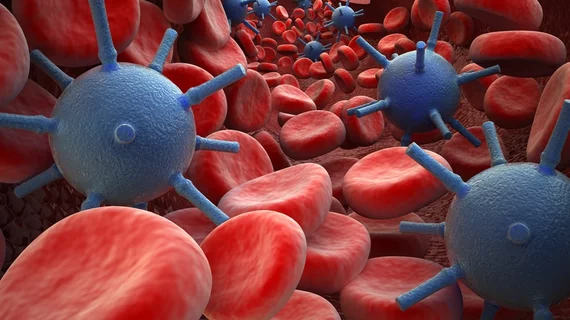Study shows COVID-19 can infect heart cells—and do serious damage in the process
A new study suggests COVID-19 has the potential to infect cardiac cells, causing changes in their ability to function after just 72 hours.
The researchers found that SARS-CoV-2, the virus behind COVID-19, was capable of infecting heart muscle cells created with stem cell technology and stored in a lab dish. They shared their findings in Cell Reports Medicine.
“We not only uncovered that these stem cell-derived heart cells are susceptible to infection by novel coronavirus, but that the virus can also quickly divide within the heart muscle cells,” first author Arun Sharma, PhD, a research fellow at the Cedars-Sinai Board of Governors Regenerative Medicine Institute in Los Angeles, said in a statement.
The infected heart cells changed their gene expression profile, the authors added, providing additional context about how the body attempts to combat the infection. And the stem cell-derived heart cells show potential as an effective way to identify and test new methods for treating COVID-19-related heart infections.
“This viral pandemic is predominately defined by respiratory symptoms, but there are also cardiac complications, including arrhythmias, heart failure and viral myocarditis,” senior author Clive Svendsen, PhD, director of the Regenerative Medicine Institute, said in the same statement. “While this could be the result of massive inflammation in response to the virus, our data suggest that the heart could also be directly affected by the virus in COVID-19.”
The full Cell Reports Medicine analysis is available here.
Related COVID-19 Content:
Myocarditis, arrhythmias and more: An ACC update on what cardiologists know about long COVID-19
Athletes with COVID-19 may require heart MRI screening for myocarditis, new data suggest
4 cardiac arrhythmias associated with COVID-19
What we know about COVID-19 and cardiogenic shock
Mild COVID-19 infections not associated with long-term risk of heart damage
The pandemic’s toll: 55 long-term side effects of COVID-19
4 key takeaways from an updated look at vaccine-related myocarditis in the U.S.
Most young people with vaccine-related myocarditis recover quickly
Intrathoracic complications in COVID patients: Incidence, associations and outcomes
Congenital heart disease increases risk of poor COVID-19 outcomes, including death
MRI scans show COVID's 'significant' impact on the brain
Heart complication seen for the first time in a young patient after COVID-19 vaccination
American Heart Association investing $10 million to study the long-term consequences of COVID-19
Cardiologist discusses COVID-19, myocarditis among professional athletes and more
Not so fast: Specialists warn against cardiac imaging for asymptomatic COVID-19 patients
Study shows COVID-19 can infect heart cells—and do serious damage in the process

